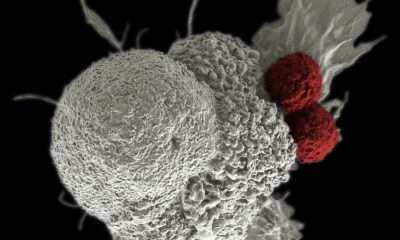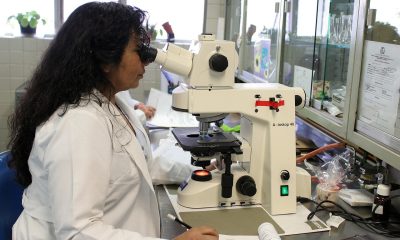Biotech
Global Experts Convene in Barcelona to Advance KRAS Cancer Research
Barcelona hosts the KRAS Think Tank Meeting, uniting global experts to share cutting-edge research on the KRAS oncogene, mutated in many cancers. Led by Dr. Rafael Rosell, the event spotlights lesser-known but crucial genes and challenges in treating KRAS-driven cancers. New therapeutic strategies, including combination treatments, offer hope for tackling resistant tumors like pancreatic cancer.

Barcelona is hosting the KRAS Think Tank Meeting this Thursday, May 22nd, bringing together around 100 researchers from different countries who are experts in the KRAS oncogene.
Four decades have passed since its identification, and much research remains. The experts will share the latest advances and findings on this gene, which is mutated in various types of cancer and of great interest as a therapeutic target.
KRAS Think Tank Highlights Emerging Therapies and Research Gaps in Cancer Treatment
The initiative was initiated by Dr. Rafael Rosell, general coordinator of the KRAS Think Tank Meeting , president of the IOR Foundation, and an international expert on KRAS in lung cancer. “Ninety-nine percent of oncologists in any country don’t know what YAP 1 (yes-associated protein 1), MRAS, or SHOC2 are, which are quite essential genes, and yet they don’t know them. They also don’t know how metabolic reprogramming occurs in tumor cells,” said Dr. Rosell.
Dr. Rafael Rosell: “Ninety-nine percent of oncologists in any country don’t know what YAP 1, MRAS, or SHOC2 are, which are quite essential genes, and yet they don’t know about them.”
“At these types of meetings, we can highlight and discuss aspects of cancer cell biology that are familiar to researchers but not yet to the medical community. There are many genes, of great importance in the field of research, that may have clinical applications,” he added.
The KRAS gene is mutated in 90-95% of pancreatic cancer cases , 40-45% of colorectal cancer cases, and 25-30% of lung cancer cases, the latter where the most common mutation is KRASG12C. Pancreatic cancer is one of the most complex cancers, and there is still much to research. “The situation is still an immense ocean of ignorance that cannot be resolved with artificial intelligence (AI) . We need to deepen our knowledge, and that is why we have provided a space for pancreatic cancer with Dr. Barbacid,” said Dr. Rosell.
A recent breakthrough in this cancer, which in a high percentage of cases does not respond to selective KRAS inhibitors , has been published in Cancer Research . According to this study, administering a RAS pathway inhibitor and also blocking a protein called PIKfyve slows the cellular recycling process (autophagy) that allows cells to escape treatment. This synergistic action can enhance the effect of other therapies targeting the same cancer pathway and opens the door to more effective therapeutic combinations for these tumors.
In lung cancer, KRAS gene mutations have been found in 95% of smokers at the time of lung adenocarcinoma diagnosis, or in ex-smokers with a long and heavy smoking history who smoked an average of half a pack or a pack of cigarettes per day and who quit smoking between five and fifteen years ago.
“Tobacco contains many carcinogens and is the main cause of lung cancer. We have observed mutations in KRAS, empirically or epidemiologically, in the tissue and blood of patients who have been smokers , but we cannot extend this statement to cases of lung cancer caused by carcinogens from air pollution or environmental factors. In smokers, these mutations are quite common and never appear alone, but rather alongside others such as p53 and others ,” explains Dr. Rosell.
“We know that not all lung tumors with KRAS mutations are sensitive, that is, respond to a treatment directed against KRAS. In fact, only 30% of cell lines with this mutation show sensitivity . That’s why we’re investigating why some tumors respond from the start and others don’t: we’re analyzing other alterations or tumor signaling pathways that could act as alternative routes (bypasses) and thus promote the growth of cells that depend on the KRAS mutation ,” explains Dr. Rosell.
In colon cancer, mutations in the KRAS gene have been identified in preneoplastic lesions , indicating that these genetic alterations are present in very early stages of the transformation of healthy tissues into malignancy.
The meeting, conceived as a high-level, multidisciplinary scientific gathering for expert audiences from the medical-scientific community, was organized by the IOR Foundation and will be held in a hybrid format: in-person, based at the Dexeus University Hospital, and online. It will feature speakers researching KRAS from a variety of disciplines, including medical oncology, biochemistry, molecular biology, genomics, immunology, and applied AI, and from institutions located in Shanghai, New York, Norway, Italy, Portugal, Greece, and Spain, among other countries.
__
(Featured image by Sangharsh Lohakare via Unsplash)
DISCLAIMER: This article was written by a third party contributor and does not reflect the opinion of Born2Invest, its management, staff or its associates. Please review our disclaimer for more information.
This article may include forward-looking statements. These forward-looking statements generally are identified by the words “believe,” “project,” “estimate,” “become,” “plan,” “will,” and similar expressions. These forward-looking statements involve known and unknown risks as well as uncertainties, including those discussed in the following cautionary statements and elsewhere in this article and on this site. Although the Company may believe that its expectations are based on reasonable assumptions, the actual results that the Company may achieve may differ materially from any forward-looking statements, which reflect the opinions of the management of the Company only as of the date hereof. Additionally, please make sure to read these important disclosures.
First published in iSanidad. A third-party contributor translated and adapted the article from the original. In case of discrepancy, the original will prevail.
Although we made reasonable efforts to provide accurate translations, some parts may be incorrect. Born2Invest assumes no responsibility for errors, omissions or ambiguities in the translations provided on this website. Any person or entity relying on translated content does so at their own risk. Born2Invest is not responsible for losses caused by such reliance on the accuracy or reliability of translated information. If you wish to report an error or inaccuracy in the translation, we encourage you to contact us

-

 Fintech1 week ago
Fintech1 week agoRuvo Raises $4.6M to Power Crypto-Pix Remittances Between Brazil and the U.S.
-

 Impact Investing9 hours ago
Impact Investing9 hours agoMainStreet Partners Barometer Reveals ESG Quality Gaps in European Funds
-

 Biotech1 week ago
Biotech1 week agoEurope’s Biopharma at a Crossroads: Urgent Reforms Needed to Restore Global Competitiveness
-

 Africa3 days ago
Africa3 days agoFrance and Morocco Sign Agreements to Boost Business Mobility and Investment
























